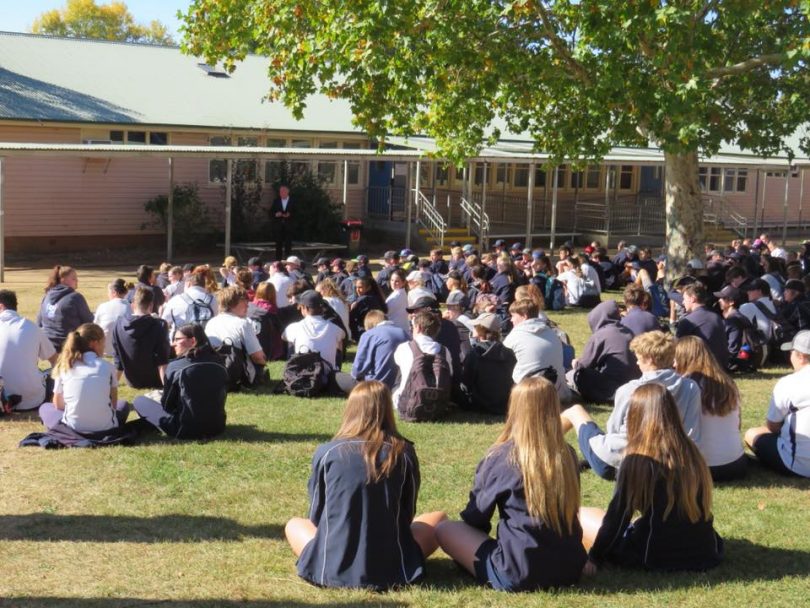
Schools in the NSW will remain open following measures announced by the Prime Minister. Photo: File.
The ban on non-essential indoor gatherings of 100 people or more will not affect schools in NSW according to the measures announced by the Prime Minister this morning (18 March), meaning all schools will remain open and there will be no change to the schedule for school holidays.
The Prime Minister said he can’t guarantee there won’t be school closures at some point in the next six months, but those decisions will be guided by the medical advice.
The NSW Department of Education is introducing proactive measures to limit the impact of COVID-19 and has adopted social distancing measures including cancelling assemblies, excursions, travel, some events and conferences.
According to the department, all major arts, sports and initiative activities and events will temporarily be ceased until further notice at NSW schools, including whole-school sporting events and inter-school events involving three or more schools.
In making the announcement, Prime Minister Scott Morrison and the Chief Medical Officer, Professor Brendan Murphy, said that there would be a far more catastrophic effect on teachers and students if schools were to close.
“The health advice supported by all jurisdictions is that schools should remain open,” Mr Morrison said.
He said the only reason children shouldn’t be at school is if they are unwell.
“Don’t leave it to the teacher to work that out. It is the responsibility of parents to manage this.
“The virus operates very differently amongst younger people. It has a different manifestation amongst younger people and that presents a very different health challenge to the broader population,” the Prime Minister said.
As well as an immediate ban on non-essential indoor gatherings of 100 people or more, Australians are still being advised to stay away from non-essential outdoor gatherings of 500 or more.
Places of essential gatherings include airports, public transport, medical facilities, aged care facilities, jails, courts, parliaments, supermarkets, office buildings, mining sites, education sites (schools, universities), childcare, retail centres, businesses and offices.
Social distancing recommendations remain in place, including advice not to shake hands or hug.
The Chief Medical Officer said it was important that no sick student or teacher went to school and hand hygiene was vital.
“So it will be hard for schools, but it would be much, much, much harder for society if the schools were closed,” he said.
“We want our children to be looked after in schools. If they were at home, we know that they probably wouldn’t stay at home, they would probably congregate anyway and if the transmission were occurring, it would happen. Or they may be looked after by vulnerable elderly relatives who are the people that we’re worried about.
“This is also what Singapore has done. Singapore has been one of the more successful countries. In Singapore, the schools are open.”
Professor Murphy said a two- to four-week shutdown of schools is not recommended and won’t achieve anything.
“We are in this for the long haul and our measures have to be sustainable. We can’t lock down schools for a month and then unlock them.
“This is different from influenza. We know that even in flu epidemics, school closures are controversial. We don’t know if children are asymptomatic,” Professor Murphy said.
However, tougher restrictions are being placed on aged care facilities where visits to residents will be limited to two people at a time, per day, in a bid to curb the spread of the coronavirus outbreak to the most vulnerable in the community.
In end-of-life situations, facilities will have the discretion to put very strict arrangements in place to enable family members to see relatives.
Restrictions at aged care facilities include:
- No visitors or staff who have returned from overseas in the past 14 days will be allowed in aged care facilities
- Anyone who has confirmed contact with a case of COVID-19 in the past 14 days will not be allowed in
- Those with fever, symptoms, acute respiratory infection will not be allowed in
- People who haven’t been vaccinated against the flu won’t be allowed in after 1 May
- Visits will also be limited to a short duration with a maximum of two people at one time per day
- Visits should be conducted in a resident’s room, outdoors or in a specific area designated by the facility, rather than communal areas where the risk of transmission to other residents is greater
- There will be no group visits or gatherings; no school group visits will be allowed
- Children under 16 will only be allowed to visit by exception.
Original Article published by Michael Weaver on The RiotACT.







